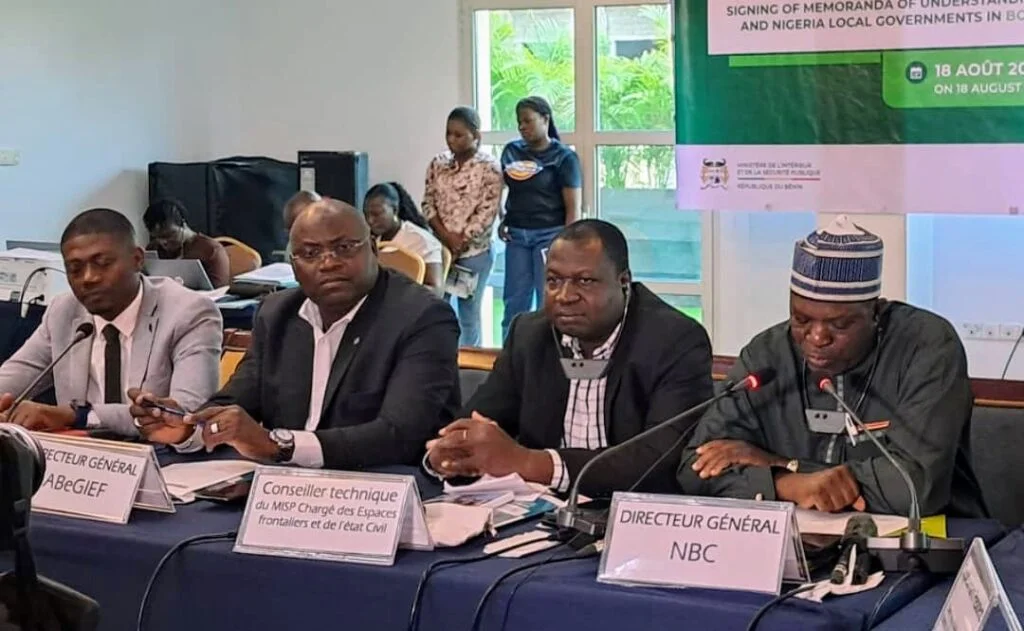Nigeria and the Benin Republic have signed a landmark local-level Memorandum of Understanding (MoU) to enhance cross-border cooperation.
Adamu Adaji, Director-General of the National Boundary Commission (NBC), said in a statement on Friday in Abuja that the agreement aimed to strengthen cross-border cooperation at the grassroots.
According to him, the agreement represents a milestone in bilateral relations, deepening collaboration between local government authorities and traditional institutions across the shared frontier.
He said the MoU was signed under the framework of the African Union Convention on Cross-Border Cooperation, the ECOWAS Cross-Border Cooperation Initiatives, and the Nigeria–Benin Cross-Border Cooperation Agreement.
*“It formalises cooperation between Chairmen of Nigeria’s Border Local Government Areas and Mayors of Communes in Benin Republic, alongside traditional rulers on both sides of the border.
“The primary objective of the agreement is to enhance the resilience of border communities against the rising threats of cross-border crimes.
“It also seeks to revive historic socio-cultural linkages disrupted by colonial-era demarcations, foster peaceful coexistence, and promote good neighbourliness among border populations,”* Adaji said.
He explained that the MoU would further provide a platform to accelerate the ongoing delimitation and demarcation of the Nigeria–Benin boundary.
By empowering local leaders and traditional institutions to engage actively in the process, the agreement is expected to ease tensions, resolve disputes amicably, and promote stability along the frontier.
Adaji added that beyond peace and security, the agreement highlighted the economic and developmental role of border communities.
Joint initiatives in trade, agriculture, infrastructure development, and cultural exchanges were envisaged as practical avenues to improve livelihoods and drive regional integration, in line with ECOWAS objectives.
“The MoU is a grassroots-driven instrument that aligns with continental and regional frameworks while providing practical solutions to the everyday realities of border dwellers,” he said.
Idris Mohammed, Chairman of Baruten Local Government Council in Kwara, who represented Nigeria’s border local government leaders, hailed the agreement as a timely response to longstanding community concerns.
*“Our people have lived with insecurity, disrupted trade, and cultural isolation for too long.
“This MoU is a message of hope that their challenges are now at the centre of bilateral cooperation,”* he said.
Similarly, Joseph Ahoyo, Mayor of Malanville Commune in Benin Republic, underscored the importance of involving local actors in cross-border governance.
*“National agreements are important, but without grassroots participation, implementation often stalls.
“This MoU is unique because it empowers communes and traditional authorities to play an active role in shaping the future of our shared border,”* Ahoyo said.
The officials on both sides emphasised that the agreement would be followed by practical steps, including the establishment of Joint Dialogue Platforms and Pilot Programmes in security cooperation, economic exchanges, and cultural revival.
These initiatives are expected to provide early benefits while reinforcing long-term objectives of peace, development, and integration.
They noted that the signing of the MoU signalled a renewed chapter in Nigeria–Benin relations.
“By bridging national policies with local realities, the agreement strengthens bilateral cooperation while serving as a model of community-driven cross-border governance for West Africa,” they said.
(NAN)







